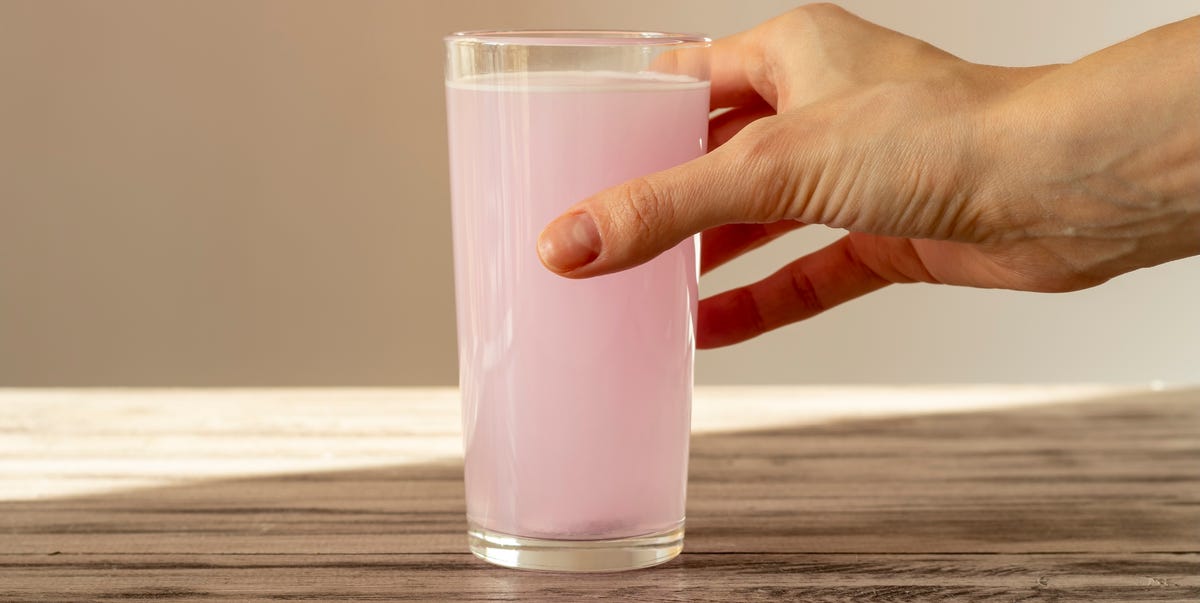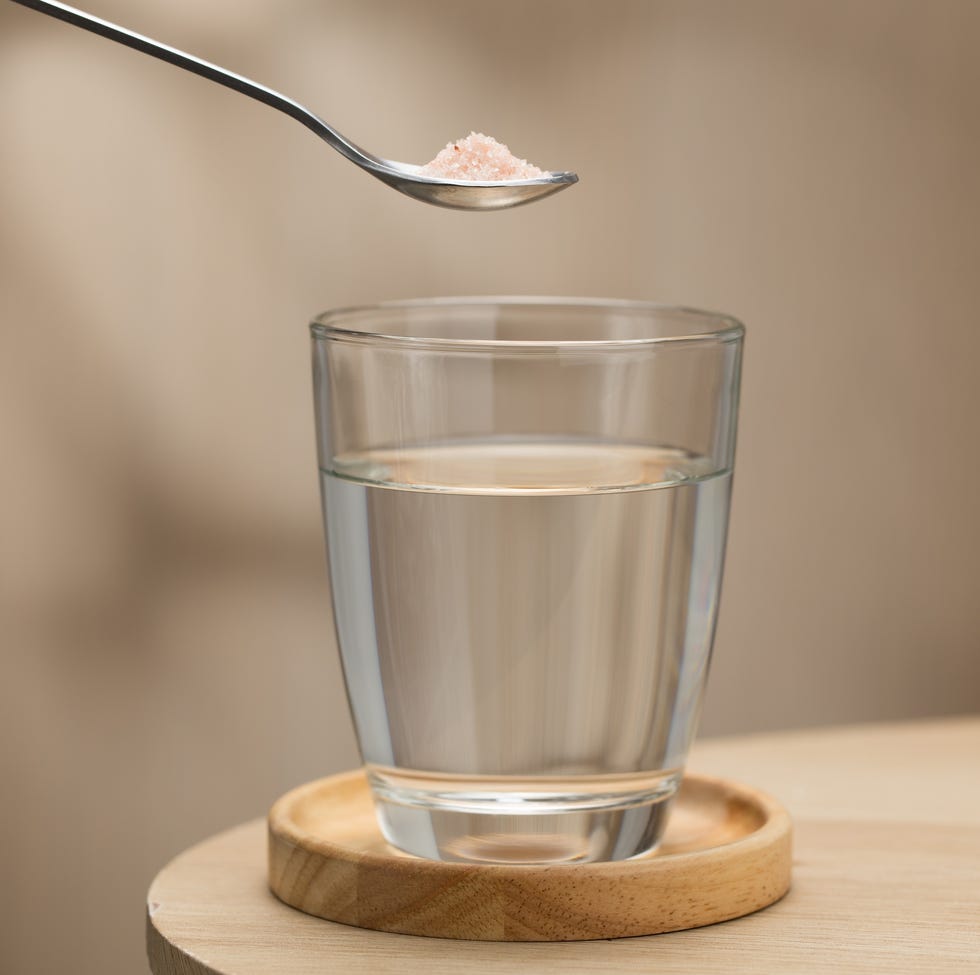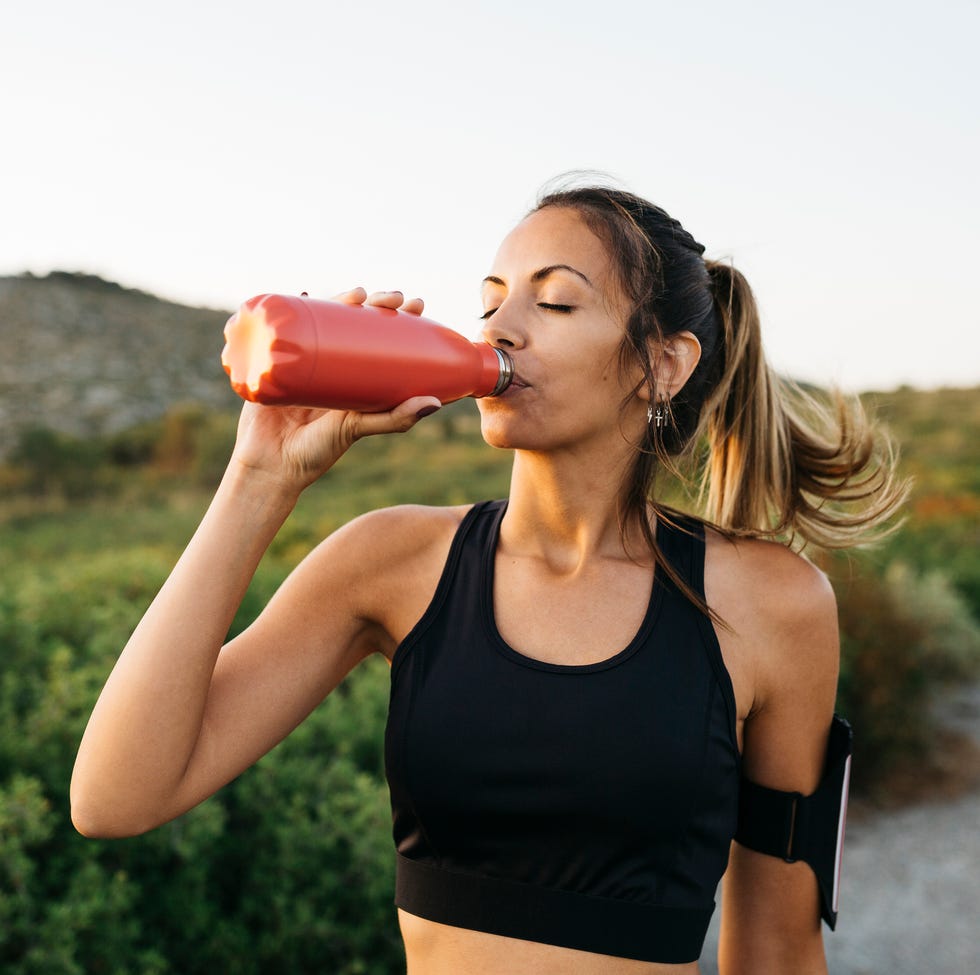You’ve likely noticed that we’re in the middle of another heatwave right now – and that social media influencers left, right and centre are suddenly banging on about the miracle hydration powers of electrolytes. Previously the preserve of marathon runners and hot yoga fans, electrolyte-infused drinks are now seemingly everywhere, but, it turns out, there’s actually too much of a good thing…
Experts are now warning that it’s possible to overdo it on the electrolytes front, and that not everyone needs to be consuming the supplement in the first place. Plus, there are a few other hydration mistakes that are commonly made which are important to be mindful of.
Here to clear up the key electrolytes and hydration-related myths that are circulating are VJ Hamilton, a BANT-registered nutritionist and functional medicine practitioner, Rania Salman, a registered dietitian and nutritionist verified on Doctify, Dr Suzanne Wylie, GP and medical adviser at iQ Doctor, and Diana Bell-Irving, electrolytes drink brand nonni‘s in-house nutritionist.
What actually are electrolytes?
First up, for all the talk about electrolytes, which are often consumed in a gel, sports drink or powder form, some of us (hi, me!) are still a little uncertain about what they actually are. “Electrolytes are minerals such as sodium, potassium, magnesium, calcium and chloride, that carry an electric charge within the body,” explains Hamilton. “They’re essential for keeping your fluid balance in check, helping nerves to send messages, supporting muscle contraction and relaxation, and regulating your body’s pH.
“When the balance of electrolytes is off, you can feel it in the form of dizziness, brain fog, muscle cramps, headaches and fatigue.”
Salman, a registered dietitian adds that your diet alone can usually ensure you get what you need in terms of the relevant minerals. “For example, potassium is abundant in bananas, oranges, and leafy greens, while magnesium is found in nuts, seeds, and whole grains.”
Ok, so electrolytes aren’t the same as adding salt to water?
In a word: no. “Adding plain table salt to water only gives you sodium and chloride. That’s like calling a one-person band an orchestra — you’re missing the other ‘instruments’ that work together to keep your body functioning optimally,” says Bell-Irving, who advises in-house at an electrolytes-infused drink brand. “Balanced electrolyte drinks combine several minerals in proportions that your body can absorb and use effectively, often alongside vitamins or plant-based ingredients for added benefits.”
Tharakorn//Getty Images
Is it bad to have electrolytes every day?
That really depends on a few factors, such as the weather (are you sweating loads and in need of replacing lost minerals?), how much you exercise (ditto, the sweat thing), your diet (be honest: do you get enough fruit and veg?) and general health.
“Basically, the goal [with electrolytes] is to top up what you’ve lost, not drown your system in minerals it didn’t ask for,” says Bell-Irving, adding that upping your intake can also be helpful if you’re recovering from illness.
Who should take electrolytes?
Salman suggests that if you’re unsure whether or not to supplement electrolytes, ask yourself if you’re sweating heavily, if you’ve exercised intensely for over an hour, or whether you’re sick or dehydrated. “If not, your best bet is a balanced diet and regular hydration,” she says.
Hamilton notes that for people with Chronic Fatigue Syndrome (CFS) or post-viral fatigue “electrolytes can literally be life changing”, explaining that many people with medically-recognised fatigue also experience low blood volume and dysautonomia (autonomic nervous system imbalance), which can lead to light-headedness, post-exertional crashes, and difficulty regulating temperature.
“The right electrolyte mix helps expand plasma volume, supports better circulation, and improves the ability to stand, move, and recover without triggering a crash,” she states. “This is especially important after activity, when fluid loss and shifts in blood flow can worsen symptoms.”
It’s important to note that if you suffer with any kind of medical condition (be it mentioned above or not), it is always advised that you consult your doctor and/or a registered professional before taking a supplement of any kind, electrolytes included. Ditto if you’re on any form of medication.
What happens if you have too many electrolytes?
A whole range of things, it turns out – and if you’re taking a brand that contains ingredients that makes your stomach upset, this could result in gas, bloating, cramps and other toilet issues.
Dr Suzanne Wylie, GP and medical adviser for IQdoctor, adds, “Regular, unnecessary use of electrolyte products can lead to excessive intake of sodium, potassium, or other minerals, which in turn can cause health issues such as raised blood pressure, kidney strain, or, in rare cases, dangerous disturbances to heart rhythm.”
The doctor adds that the safe amount of electrolyte supplementation will vary depending on age, medical history, diet, and level of physical activity. “For example, a competitive athlete training for hours in hot conditions will have higher needs than someone with a sedentary lifestyle in a temperate climate.”
Many commercial electrolyte drinks contain 1,000 mg or more of sodium per serving, which is about 40% of the recommended daily intake, adds Salman.
“In addition, sugar plays a role in hydration. In proper amounts, it helps facilitate water absorption in the small intestine via sodium-glucose transport proteins. Yet, many modern electrolyte drinks are sugar-free due to public fear of sugar,” Salman continues, sharing that this can compromise the effectiveness in rehydration scenarios.
“You might also feel puffy, notice increased thirst, get headaches, feel light-headed, or have heart palpitations,” adds Hamilton. “Too much potassium or magnesium can cause weakness, tingling, or diarrhoea.
“In rare cases, especially in people with kidney or heart issues, it can cause serious complications.”
Jordi Salas//Getty Images
What other common hydration mistakes are we making?Not drinking enough water
The NHS recommends we all drink eight glasses of fluid a day, which equates to roughly 1.5 to 2 litres – tea, coffee and squash mixed with water all count, by the way! However, this rough guidance doesn’t apply if you’re, say, running a marathon or have spent twenty minutes in a sauna and emerge feeling like a dried out prune: if you’re doing an activity that’s causing you to sweat, take more water on board.
Drinking too much (yup, that’s a thing)
…That said, don’t overdo it! If your urine is clear or a very, very pale yellow, that’s a sign you might be over-hydrating and ought to dial it back a tad.
Unnecessary electrolytes
As detailed above, not everyone should be drinking electrolytes on a regular basis. In fact, some people may never need to supplement them in, if they’re not overly sweaty due to heat, illness or the weather, or have a strong well-rounded diet.
This article is not a substitute for medical advice. If you’re at all worried about your health, especially if you have new symptoms, then book an appointment with your GP.
Related Stories
Jennifer Savin is Cosmopolitan UK’s multiple award-winning Features Editor, who was crowned Digital Journalist of the Year for her work tackling the issues most important to young women. She regularly covers breaking news, cultural trends, health, the royals and more, using her esteemed connections to access the best experts along the way. She’s grilled everyone from high-profile politicians to A-list celebrities, and has sensitively interviewed hundreds of people about their real life stories. In addition to this, Jennifer is widely known for her own undercover investigations and campaign work, which includes successfully petitioning the government for change around topics like abortion rights and image-based sexual abuse. Jennifer is also a published author, documentary consultant (helping to create BBC’s Deepfake Porn: Could You Be Next?) and a patron for Y.E.S. (a youth services charity). Alongside Cosmopolitan, Jennifer has written for The Times, Women’s Health, ELLE and numerous other publications, appeared on podcasts, and spoken on (and hosted) panels for the Women of the World Festival, the University of Manchester and more. In her spare time, Jennifer is a big fan of lipstick, leopard print and over-ordering at dinner. Follow Jennifer on Instagram, X or LinkedIn.



